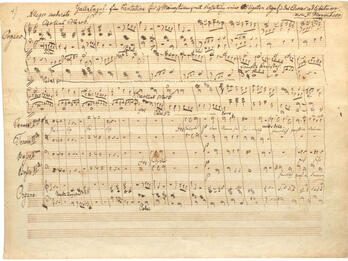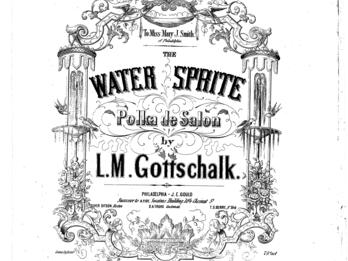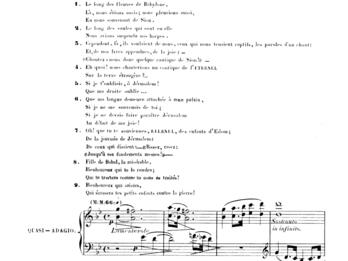Seu Shearim (Lift Up Your Heads, O Gates)
Samuel Naumbourg
1847
Image

Engage with this Source
Creator Bio
Samuel Naumbourg
1815–1880
Born near Ansbach, Bavaria (now in Germany), Samuel Naumbourg was raised in a family connected to a long lineage of cantors. After receiving musical training in Munich, Naumbourg settled in Paris in 1843, establishing himself as an influential choirmaster among the city’s synagogue choirs. Over the course of his career, Naumbourg compiled and published synagogue music for a broad audience, drawing on both his southern German heritage and conventions of opera popular in France at the time to give his music wide appeal.
Related Guide
Music and Opera in Jewish Culture
1750–1880
One of the most striking changes in European Jewish culture toward the later eighteenth century was marked by the entry of Jews into art music, opera houses, and the stage.
You may also like

Hallelujah: Eine Cantatine für 4 Männerstimmen mit begleitung einer obligaten orgel und des chores ad libitum
The manuscript is believed to be the earliest extant Reform Jewish liturgical composition. An early example of the work of Giacomo Meyerbeer, “Hallelujah” was probably prepared for use at a service at…
Esther’s Triumph
Friends, let’s celebrate this day—Viva!
Purim, occasion to be gay—Viva!
Safe and free from Haman’s wrong,
Let’s shout in unison this song—Viva, viva, viva . . .
Esther, brilliant as the sun—Viva!
G…
Kerakh shel romi (City of Rome)
The Bah (Bayit Hadash) was asked concerning the practice in synagogues of using music which is sung in the houses of worship (of non-Jews). It is only forbidden regarding…

The Water Sprite—Polka
Louis Gottschalk wrote “The Water Sprite—Polka de Salon” soon upon his return to the United States after spending most of his teenaged years in Europe, where he was sent by his father to study music…

Super flumina Babylonis
Charles-Valentin Alkan composed this setting of Psalm 137 (“By the rivers of Babylon”) in 1859, the same year that his friend Franz Liszt composed a setting for the same biblical verses. Unlike Liszt…
Whisky
So let’s drink whisky, brothers—
let’s hope we live to drink again.
Let’s drink now—enough of eating.
How can you forget about whisky for so long!
If we didn’t have whisky,
how would we live in this…


